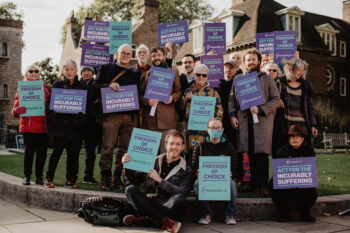
Plans to allow doctors to help terminally ill adults end their lives moved closer to becoming law today, after a new Assisted Dying Bill passed its second reading in the House of Lords. Humanists UK, which campaigns to legalise assisted dying for both the terminally ill and incurably suffering, has praised today’s debate for its in-depth and sensitive discussion of the issue.
The Assisted Dying Bill was proposed as a Private Members’ Bill by Baroness Meacher. Under her proposals, adults of sound mind in England and Wales would soon be allowed to request assistance to die if they had six or fewer months left to live. Each request would need the approval of two independent doctors and a High Court judge.
Opening the debate, in which more than 100 peers spoke, Baroness Meacher said that the current law on assisted dying was both ‘unsafe’ and caused ‘untold suffering’. She highlighted that under the current law the only ‘grim’ options terminally ill patients have at their disposal are starving themselves to death, refusing life-saving treatment, or breaking the law and travelling to Switzerland.
14 humanist peers who are members of the All-Party Parliamentary Humanist Group spoke in support, including Co-Chair Baroness Bakewell, Treasurer Lord Dubs, Vice-Chair Lord Taverne, Lord Trees, and Baroness Flather. Baroness Bakewell raised the case of Humanists UK’s former patron and Supreme Court claimant Paul Lamb – who was paralysed from the neck down for more than 30 years. She emphasized the robust nature of the safeguards proposed in the legislation, and the distraught circumstances in which terminally ill people are currently forced to end their lives. Lord Taverne highlighted that medical opinion had radically shifted since proposals to change the law were previously debated in 2014, with the BMA recently reporting that half of all doctors personally support assisted dying reform. He also called for the Bill to go further to support the incurably suffering as well as the terminally ill. Lord Dubs focused on the psychological reassurances that a change in the law can provide, and cited evidence from Oregon that roughly a third of people who apply for an assisted death ultimately decide not to end their lives.
Earlier in the day, hundreds of protesters and Humanists UK’s patron Dr Henry Marsh joined Humanists UK in a rally outside of Parliament in support of the Bill. Speaking about the urgent need for reform, Humanists UK’s Chief Executive Andrew Copson stressed the inequalities of the current law which enables those with the financial means of travelling to Switzerland to avoid unnecessary suffering.
Throughout the debate, a number of peers including Lord Field, whose contribution was read out on his behalf, and Lord Hogan-Howe acknowledged that their views on assisted dying had changed. Contributions in support of the proposals came from a wide-ranging number of peers, including the former Archbishop of Canterbury Lord Carey; former Court of Appeal Judge Lord Etherton; former Supreme Court Judges Lord Mance and Lord Neuberger, who sat as judges during Paul Lamb and Jane Nicklinson’s judicial review in 2014; former Metropolitan Police Commissioner Lord Blair; and former Scottish Conservative Party Leader Baroness Davidson.
Humanists UK’s Chief Executive Andrew Copson said:
‘We’re delighted the Assisted Dying Bill has passed its Second Reading. This Bill is limited to adults with terminal illnesses and therefore does not go as far as we’d wish to see, which would mean covering the incurably suffering as well. Nonetheless, we fully support it as a step in the right direction. And its reception in the House of Lords today was a significant victory for the rights and choices of those in desperate need of a change in the law.
‘Almost everyone in society agrees that those at the end of their life deserve the ability to die without pain, and in a dignified and peaceful manner. Yet in the vast majority of peers’ contributions today, examples were given of how the current ban on assisted dying fails to live up to this standard and causes unnecessary cruelty and suffering to dying people. Nine in ten members of the public now favour legalising assisted dying for those with either terminal or incurable conditions, half of all doctors personally want to see a change in the law, and tragically at least one person travels to Switzerland to end their life every week. With this in mind we very much hope Baroness Meacher’s Bill will continue its legislative journey and soon enshrine the values of dignity, compassion, and autonomy into our law.’
Notes:
For further comment or information, please contact Humanists UK Director of Public Affairs and Policy Richy Thompson at press@humanists.uk or phone 020 7324 3072 or 020 3675 0959.
Freedom of choice is at the heart of Humanist UK’s campaign to legalise assisted dying. In many cases, the person in question will be terminally ill. However, we do not think that there is a strong moral case to limit assistance to terminally ill people alone and campaign for a change in the law that would be responsive to the needs of other people who are permanently and incurably suffering.
Read more about our campaign to legalise assisted dying.
Humanists UK is the national charity working on behalf of non-religious people. Powered by 100,000 members and supporters, we advance free thinking and promote humanism to create a tolerant society where rational thinking and kindness prevail. We provide ceremonies, pastoral care, education, and support services benefitting over a million people every year and our campaigns advance humanist thinking on ethical issues, human rights, and equal treatment for all.
In 2021, Humanists UK is celebrating its 125th anniversary with a renewed focus on its history. The new website Humanist Heritage is a rich new web resource that uncovers the untold story of humanism in the UK – a story of people, groups, objects, places, movements, publications, and ideas.
